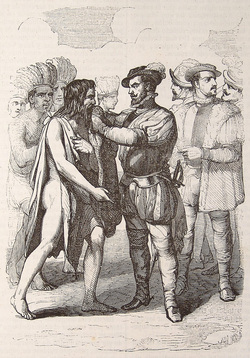
Are you surprised?
At a press conference in front of the Salt Lake County Jail on Friday, authorities announced the arrest of 42-year-old Victor Manuel Rax, a Guatemalan who allegedly was using teenage boys from undocumented families against their will both for sex and for selling illegal drugs.
Rax may not bring to mind the stereotypical 19th century Southern plantation owner who employed bosses to watch slaves and whip them if they got out of line, but his reported methods were similar.
| | All slave holders rely on the same thing — convincing their subjects that escape is either hopeless or would bring about worse consequences. In this case, according to Ken Wallentine, chief of law enforcement with the Utah Attorney General’s Office, Rax used the nation’s lack of immigration reform as an accomplice. He told the boys he “owned” them, “And secondly, I own your families. You don’t cooperate with me, then I go to federal authorities.” The thought of Rax going to federal authorities to report someone as undocumented may be laughable from where you sit, but from the perspective of someone struggling to carve out a better life, who lives in constant fear of deportation, it was a powerful weapon. It was powerful enough that the last time Rax was arrested he was let go because his victims were too scared to testify. Fear of deportation is as powerful as the fear of a whip in the antebellum South — not that the whip isn’t used today, as well. Another frequent weapon is the realistic argument that no one will believe the victim. In particular, women who are forced into the sex trade also are kept largely hidden by a culture that is becoming ever more accepting of sex and suspicious of those who would try to control it. In a world where predators are becoming accepted, it’s hard to tell the difference between the ones who cry wolf because they are intolerant of wolves from the ones who do so because they are about to get eaten. On the other side are laws that are just as likely to punish the sex slave as to provide her with a path to freedom. How big of a problem is this? From my several visits through the years with State Department officials charged with combating human trafficking, I know the estimates of people being held against their will in the world vary widely — from 2 million to 30 million. It’s certainly worse in parts of the world other than the United States. Activists say, by sheer numbers, slavery is a bigger problem worldwide today than it ever was in Lincoln’s day. The State Department’s latest report on the problem notes that the United States has had several “notable prosecutions” in the past year, including “defendants who used violence and torture to hold U.S. citizen girls and women — including a pregnant woman — in prostitution in Tennessee; defendants who held four Eastern European women in forced labor in massage parlors and forced prostitution in Illinois; a defendant who held four West African children in forced labor as domestic servants in Michigan,” and on and on. The problem isn’t going to get better any time soon. The Wall Street Journal reports that the largest segment of people now entering the United States without documentation are young people pushed here by violence and unrest in Central America. They will become prey to people eager to exploit them in exchange for promises of security. A Deseret News story about a panel discussion at the University of Utah last month quoted Salt Lake City Police Lt. Fred Ross saying, “For us to think in Utah that human trafficking doesn't exist … we've got something to learn.” We had better learn fast. A good first step would be for Washington to enact immigration reform that makes it easier to separate the bad guys from the good. Then we need to demand more attention to the crime of prostitution and its real victims. We owe that much to Abraham Lincoln nearly 149 years after his death. |

 RSS Feed
RSS Feed

